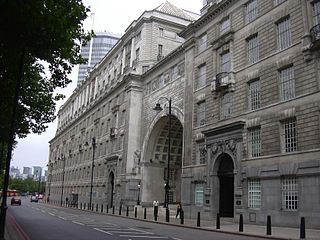Related Research Articles
Negligence is a failure to exercise appropriate and/or ethical ruled care expected to be exercised amongst specified circumstances. The area of tort law known as negligence involves harm caused by failing to act as a form of carelessness possibly with extenuating circumstances. The core concept of negligence is that people should exercise reasonable care in their actions, by taking account of the potential harm that they might foreseeably cause to other people or property.
A lawsuit is a proceeding by one or more parties against one or more parties in a civil court of law. The archaic term "suit in law" is found in only a small number of laws still in effect today. The term "lawsuit" is used with respect to a civil action brought by a plaintiff who requests a legal remedy or equitable remedy from a court. The defendant is required to respond to the plaintiff's complaint or else risk default judgment. If the plaintiff is successful, judgment is entered in favor of the defendant. A variety of court orders may be issued in connection with or as part of the judgment to enforce a right, award damages or restitution, or impose a temporary or permanent injunction to prevent an act or compel an act. A declaratory judgment may be issued to prevent future legal disputes.
In some common law jurisdictions, contributory negligence is a defense to a tort claim based on negligence. If it is available, the defense completely bars plaintiffs from any recovery if they contribute to their own injury through their own negligence.
Trover is a form of lawsuit in common law jurisdictions for recovery of damages for wrongful taking of personal property. Trover belongs to a series of remedies for such wrongful taking, its distinctive feature being recovery only for the value of whatever was taken, not for the recovery of the property itself.
Fair comment is a legal term for a common law defense in defamation cases. It is referred to as honest comment in some countries.
Misfeasance in public office is a cause of action in the civil courts of England and Wales and certain Commonwealth countries. It is an action against the holder of a public office, alleging in essence that the office-holder has misused or abused their power. The tort can be traced back to 1703 when Chief Justice Sir John Holt decided that a landowner could sue a police constable who deprived him of his right to vote. The tort was revived in 1985 when it was used so that French turkey producers could sue the Ministry of Agriculture over a dispute that harmed their sales.
Robinson v Kilvert (1889) LR 41 ChD 88 is an English tort law case concerning nuisance. It deals with what is sometimes called the issue of a "sensitive claimant".

Daulia Ltd v Four Millbank Nominees Ltd [1977] is an English contract law case, concerning unilateral contracts, and when embarking on the performance of an act for which an offer is open, at what point the offer may be withdrawn. In particular, Goff LJ observed that there would be a duty to not prevent full performance of terms in a unilateral offer, once performance had begun.

Hochster v De La Tour[1853] EWHC J72 (QB) is a landmark English contract law case on anticipatory breach of contract. It held that if a contract is repudiated before the date of performance, damages may be claimed immediately.

Robinson v Harman (1848) 1 Ex Rep 850 is an English contract law case, which is best known for a classic formulation by Parke B on the purpose and measure of compensatory damages for breach of contract that,
the rule of the common law is, that where a party sustains loss by reason of a breach of contract, he is, so far as money can do it to be placed in the same situation, with respect to damages, as if the contract had been performed.

Addis v Gramophone Co Ltd [1909] AC 488 is an old English contract law and UK labour law case, which used to restrict damages for non-pecuniary losses for breach of contract.
The Virginia Circuit Courts are the state trial courts of general jurisdiction in the Commonwealth of Virginia. The Circuit Courts have jurisdiction to hear civil and criminal cases. For civil cases, the courts have authority to try cases with an amount in controversy of more than $4,500 and have exclusive original jurisdiction over claims for more than $25,000. In criminal matters, the Circuit Courts are the trial courts for all felony charges and for misdemeanors originally charged there. The Circuit Courts also have appellate jurisdiction for any case from the Virginia General District Courts claiming more than $50, which are tried de novo in the Circuit Courts.

Landeros v. Flood was a 1976 court case in the state of California involving child abuse and alleged medical malpractice.

Shadwell v Shadwell [1860] EWHC CP J88 is an English contract law case, which held that it would be a valid consideration for the court to enforce a contract if a pre-existing duty was performed, so long as it was for a third party.

Slade's Case was a case in English contract law that ran from 1596 to 1602. Under the medieval common law, claims seeking the repayment of a debt or other matters could only be pursued through a writ of debt in the Court of Common Pleas, a problematic and archaic process. By 1558 the lawyers had succeeded in creating another method, enforced by the Court of King's Bench, through the action of assumpsit, which was technically for deceit. The legal fiction used was that by failing to pay after promising to do so, a defendant had committed deceit, and was liable to the plaintiff. The conservative Common Pleas, through the appellate court the Court of Exchequer Chamber, began to overrule decisions made by the King's Bench on assumpsit, causing friction between the courts.

Mogul Steamship Co Ltd v McGregor, Gow & Co [1892] AC 25 is an English tort law case concerning the economic tort of conspiracy to injure. A product of its time, the courts adhered to a laissez faire doctrine allowing firms to form a cartel, which would now be seen as contrary to the Competition Act 1998.

The Statute of Frauds Amendment Act 1828, commonly known as Lord Tenterden's Act, was an Act of the Parliament of the United Kingdom. Lord Tenterden served as Lord Chief Justice of the King's Bench between 1818 and 1832. Its purpose was for "rendering a written Memorandum necessary to the Validity of certain Promises and Engagements".

C&P Haulage Co Ltd v Middleton [1983] EWCA Civ 5 is an English contract law case, concerning damages for costs incurred by a claimant related to a defendant's breach of contract.
Truter and Another v Deysel is an important case in South African law, with particular resonance in the area of civil procedure and medical malpractice. It is also frequently quoted or invoked for its definition of "cause of action." It was heard in the Supreme Court of Appeal by Harms JA, Zulman JA, Navsa JA, Mthiyane JA and Van Heerden JA on 24 February 2006; judgment was delivered on 17 March. Counsel for the appellants was JG Dickerson SC; AC Oosthuizen SC appeared for the respondent. The case was an appeal from a decision in the Cape Provincial Division by Mlonzi AJ.

Venning v Chin (1974) 10 SASR 299 is a Supreme Court of South Australia full court judgment, by which it was decided that in trespass cases, the onus lies on the defendant to disprove fault. However, for injuries caused in highway accidents, the onus is on the plaintiff to prove fault on the part of the defendant.